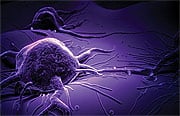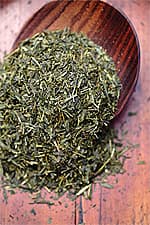Life Extension Magazine®
As if confronting a potentially fatal disease were not daunting enough, many cancer patients also have to contend with a host of debilitating side effects induced by chemotherapy and radiation treatment. These range from fatigue and hair loss to life-threatening pneumonia and emboli or a crippling wasting of lean muscle mass. Today, however, more cancer care specialists are recognizing the value of integrative programs that incorporate specialized diets, health-promoting herbs and nutrients, and mind-body therapies to increase the efficacy of conventional cancer treatment while limiting its harmful side effects.1,2 At the forefront of this emerging model of integrative cancer care is Dr. Keith Block, who has long maintained that nutrients and phytochemicals provide critical support for cancer patients. At the Block Center for Integrative Cancer Treatment, patients benefit from customized treatment regimens designed to boost immunity, mitigate side effects, help prevent the loss of muscle mass (cachexia), maximize the efficacy of chemotherapy, and stop the spread of cancer. In this article, we describe how Dr. Block’s newly released book Life Over Cancer and approach to integrative cancer care are providing patients with a “survivor’s edge” by enhancing quality of life, reducing toxicity, and improving patient outcomes. This approach charts an exciting new future for comprehensive cancer treatment. Unique, Individualized Cancer CareLocated in Evanston, Illinois, the Block Center for Integrative Cancer Treatment was founded in 1980 by Drs. Keith and Penny Block. This research-based treatment center combines the best of conventional cancer treatment modalities with complementary non-drug therapies such as personalized nutritional supplementation, customized exercise, therapeutic diet, massage, and training in yoga, meditation, and mind-body stress care. The Center seeks to provide comprehensive, integrative cancer care through individualized treatment regimens aimed at restoring the biological integrity of the patient and forming the foundation of a long-lasting recovery.
The Block Center’s approach to cancer care begins with a detailed patient assessment, including biochemical, molecular and gene-based profiles and clinical evaluations of nutritional and physical status, quality of life, and well-being. These data are used to create an individualized care plan that emphasizes patient involvement and includes a customized nutritional regimen, with therapeutic physical, psychological, and emotional interventions. Since each patient’s biology is continually changing, treatment options are constantly reviewed and revised based on the most current diagnostic and medical data. This means that every component of care is individualized to match a patient’s unique biology, disease and treatment specifics, and personal and family needs. “We provide detailed education for each patient, including a strong biological understanding of their comprehensive clinical treatment plan and hands-on training,” Dr. Block tells Life Extension. “It’s not enough to simply prescribe—patients need to be trained and equipped to carry out a therapeutic regimen. We believe patients must be active participants in their care—that is, they must ‘own’ it.” Block Center’s Cancer Rehabilitation ProgramAccording to Dr. Block, “We won’t start chemotherapy with a patient who is not fit enough to withstand and benefit from the treatment. Otherwise, it is unfair to the patient and gives the cancer a decided advantage. The disease already has a head start, so cancer patients must be physically, psychologically, and nutritionally strengthened to be able to take it on.” This rehabilitation program, which is tailored to each patient and is monitored throughout treatment, is regularly modified according to the patient’s changing condition, and continues until full recovery. Patients on conventional chemotherapy often suffer from post-treatment symptoms such as fatigue, “chemo brain” (changes in memory and attention following chemotherapy), physical weakness, and depression. The Block Center’s rehabilitation program enables patients to better tolerate chemotherapy, and to regain and rebuild their resilience. Conventional treatments can lead to a burden of toxic metabolites. On entering the blood, these complexes can trigger inflammatory cascades resulting in increased mutation and thus more aggressive cancer cells. This can lead to treatment resistance and a greater potential for progression and recurrence. Detoxification strategies are a critical aspect of addressing these metabolites and the rehabilitative process. Chronotherapy: Maximizing the Efficacy of ChemotherapyWhen chemotherapy is required, doctors at the Block Center use a unique method of drug delivery called chronomodulated chemotherapy, also known as chronotherapy, which seeks to coordinate the body’s biological rhythms with the application of chemotherapy. Every drug has an optimal time of application when it is least toxic and most effective.
The Block Center is the first US medical clinic to use a portable, computerized, FDA-approved pump to administer chronotherapy. Unlike conventionally infused chemotherapy, this chronomodulated method provides a coordinated rhythm of dosing based on “timing.” Infusion of the chemotherapy drug resembles a perfectly symmetrical wave, called a sine wave curve: it starts slowly and ratchets up, hour by hour, slowly increasing to the middle point of the cycle, where it peaks and infuses most of the drug, and then slowly ratchets back down. The timing of the drug is based on several important factors related to the medication’s characteristics, the patient’s circadian rhythms, and the nature of the cancer. This coordination of biological rhythms creates a better “kill rate” for the cancer, with less toxicity to healthy cells. Patients are able to wear this small portable pump in a fanny pack around their waist, allowing them to be active during treatment and maintain routine activities.3-5 Patients who undergo these advanced chemotherapy treatments in the context of a full integrative medical program often report only mild or negligible side effects. This is highly significant, since as many as a third of all cancer patients abandon chemotherapy before its completion due to their inability to tolerate its physical side effects and the associated psychological stress. In fact, published research confirms that chronotherapy is associated with improved outcomes, including reduced toxicity and improved survival. A review of patients with metastatic colon cancer found that chronomodulated chemotherapy halved toxicity and doubled treatment response.6 Another review found that in patients with advanced metastatic ovarian cancer, optimal timing of chemotherapy quadrupled five-year survival rates, in addition to reducing toxic side effects by 50%.7
Dr. Block says that chronotherapy has enabled patients who were unable to tolerate conventional chemotherapy to use the same chemotherapy drug they previously stopped and to complete chemotherapy treatment. Chronotherapy has also benefited patients whose cancers were previously inoperable, by reducing the size of their tumors enough to make surgery possible. Over 40 major centers in Europe are currently participating in collaborative research using this method of chemotherapy administration. Establishing Optimal Health Through NutritionDr. Block believes that it is as critical to establish optimal health through integrative and nutritional interventions, especially in treating advanced cancer, as it is to eradicate the disease itself. “We focus on developing a path to recovery through a comprehensive and integrative program of treatment and care,” he notes. “We view illness as a turning point, a wake-up call for reclaiming your health and transforming your life.” For over two decades, Dr. Block and his research team have been investigating the effect of nutritional interventions on various cancers among different patient populations. These findings have been incorporated in the Center’s nutritional program, which emphasizes nutrients such as fish oil rich in EPA (eicosapentaenoic acid), EGCG (epigallocatechin gallate, the principal polyphenol in green tea), selenium, glycine, silymarin (a flavonoid in milk thistle),1,2 and DIM (diindolylmethane, an indole found in cruciferous vegetables such as broccoli and cauliflower). In addressing difficult-to-treat oncology issues, particularly for patients with advanced cancer, Dr. Block will adopt more aggressive nutritional and medical strategies, “leaving no stone unturned” for cancer management. Besides improving stamina and vitality, Dr. Block’s program now targets malignancy by inhibiting angiogenesis, inducing programmed cell death, blocking cellular growth, and boosting immune function. Building a Nutritional FoundationThe Block Center’s core nutraceutical program for cancer management has three components: first, laying a foundation of nutritional support; second, targeting the biochemical environment the disease resides in; and third, addressing the molecular pattern of the disease, along with the coupling of nutraceuticals with treatments in order to improve response while reducing toxicity. The first part focuses on meeting the patient’s basic nutritional needs. Nutritional programs are personalized through testing, and implemented with the goal of restoring stamina and vitality. The Block program recommends a diet rich in antioxidants and whole plant-based supplements that reflect the full spectrum of nutrients found in food. Dr. Block believes that combinations of antioxidants have more potent anticancer effects than individual nutrients.8-10
A diet low in saturated fats and high in fiber, complex carbohydrates, fruits, cruciferous vegetables, omega-3 fatty acids, and plant-based sources of protein helps form this foundation. This nutritional strategy targets the patient’s internal terrain, creating an environment inhospitable to further disease. This is intended to help curtail inflammation, reduce free-radical damage, minimize platelet activation (which can lead to dangerous blood clotting), manage blood sugar surges, and reduce serum levels of insulin-like growth factor 1, or IGF-1 (which stimulates cell multiplication and inhibits cell death). Integrated into the core Block nutrition plan are additional micronutrients, macronutrients, and phytochemicals that more fully and quickly improve general resistance. For many cancer patients, these may include vitamin B12, selenium, beta-carotene, zinc, folic acid, vitamin C, vitamin D, gamma tocopherol, vitamin K, calcium, magnesium, chromium, lycopene, and lutein. Dr. Block also uses a Chinese botanical adaptogenic formula to increase the body’s resistance to stress, help patients overcome fatigue and malaise induced by chemotherapy and radiation, and improve vitality. Unlike conventional cancer management, the Block Center’s foundational program targets one of the most serious consequences of the disease, known as cancer cachexia. This is a type of malnutrition associated with appetite suppression, muscle wasting, weight loss, and weakness. Dr. Block quotes research indicating that 20-30% of cancer patients actually die from complications of malnutrition, rather than from cancer itself. In addition, he says, 80% of cancer patients suffer from some form of clinical malnutrition, yet many oncologists still consider proper nutrition an “incidental” rather than a crucial factor in the battle against cancer.
Diets that are high in EPA-rich fish oil may help cancer patients suffering from cachexia to gain weight and improve their nutritional status.11 EPA may also counter cancer cachexia through its anti-inflammatory effects and its ability to displace arachidonic acid, a pro-inflammatory omega-6 fatty acid, from cell membranes.12 Reducing intake of foods containing arachidonic acid, such as red meat, egg yolks, poultry, and dairy products, can also help shift the body’s biochemistry away from a pro-inflammatory environment. A high intake of L-glutamine can likewise have a beneficial muscle-sparing effect to help prevent cancer cachexia.13-15 | ||||||||
Targeting the Disease and Its MicroenvironmentThe second part of the program targets the disease itself by blocking angiogenesis (the growth of blood vessels that feed tumors), slowing cancer growth, facilitating apoptosis (programmed cancer cell death), and preventing tumor metastasis (cancer spread) throughout the body. Some of these biomarkers include a unique set of biochemical tests that include inflammatory, coagulation, and oxidative labs, and others that zero in on dysglycemia and stress maladaption. Dr. Block uses specific phytochemicals and nutrients to address this aspect of cancer treatment. “Plant medicines have multiple potential uses—they are pleiotrophs—and produce many effects that enable them to hit more than one target at a time,” he explains. Based on extensive research, Dr. Block and his associates have pioneered what they call multifocal angiostatic therapy. By combining selected nutritional agents to inhibit angiogenesis, it may be possible to cut off the vascular supply needed to fuel tumor growth. Examples of compounds that Block and his team are evaluating include fish oil, EGCG from green tea, selenium, glycine, silymarin, DIM (diindolylmethane), soy, genistein (a soy-derived phytoestrogen), and quercetin (a bioflavonoid derived from fruits and vegetables). His focus includes using multi-targeted, multi-ingredient formulations to help support various needs cancer patients face and increasing bioavailability through nanoparticle supplementation.
Another important component of cancer management is slowing growth and blocking metastasis, the process by which cancer spreads from where it first arose as a primary tumor to secondary locations in the body. According to Dr. Block, a number of phytonutrients and botanical agents may accomplish this.16-18 For example, in animal studies, modified citrus pectin fights cancer by inhibiting primary tumor growth and suppressing cancer metastasis.16,17 Modified citrus pectin may hold promise for men whose prostate cancer has failed to respond fully to conventional treatments. Until recently, doctors routinely measured levels of prostate-specific antigen (PSA), a marker of prostate cancer or disease. Rising levels of PSA have been used to measure disease progression. Administering modified citrus pectin to these men increases their PSA doubling time, indicating a slowing of disease progression.18 In addition to fighting angiogenesis, EGCG from green tea has anti-metastatic properties that may block the spread of tumors. Studies suggest that EGCG may work in part by blocking the activity of matrix metalloproteinase enzymes. When over-expressed, these enzymes promote tumor angiogenesis and metastasis.19,20 Other nutrients that may help prevent metastasis are silibinin,21 a flavonoid derived from milk thistle, and bromelain,22 an enzyme fraction derived from pineapple. By decreasing levels of immune system white blood cells, conventional cancer treatment often leaves patients vulnerable to infections. Thus, boosting the body’s immune defenses and surveillance in order to prevent infection is an important component in this part of Dr. Block’s program. Natural killer cells in the immune system are crucial to effective immune defense. Their essential functions include killing virus-infected cells of the body, and seeking and destroying cancer cells. The nutrients selenium, beta-carotene, and zinc increase circulating levels of natural killer cells and boost their cancer-killing activity.23-27 Dr. Block also recommends beta-glucans, probiotics, and glutamine for supporting immune health in cancer patients.
Improving Quality of LifeThe Block Center seeks to strengthen a cancer patient’s health before, during, and after chemotherapy. Implementing a comprehensive, individualized program that includes dietary and nutritional support, physical exercise, and mind-body stress-reduction techniques can help cancer patients minimize the complications of their disease and the side effects associated with conventional cancer treatment. Because patients often feel abandoned following the completion of chemotherapy, the Block program continues even after a patient returns home once active treatment is completed. One goal is to improve patients’ odds against the potential of disease recurrence. This continuity, extending beyond treatment, not only helps avoid the “disconnect from care” often seen in conventional cancer treatment, but also reduces the chances of ongoing complications from the disease. ConclusionDr. Block’s comprehensive approach is informed by first-hand personal experience with the challenges of fighting cancer and its complications. As a teenager, he witnessed his grandmother’s struggle with breast cancer. As her body wasted, her doctors did nothing to halt her physical decline—not nutritionally, physically, or even medically. She eventually succumbed to the disease. Witnessing his grandmother’s experience engendered a deeper insight into the courage, strength, and unrelenting fight needed to endure and survive cancer. “It is no longer a question of whether genuine integrative treatment helps patients, but rather why all cancer patients are not given a more meaningful approach to help combat their cancer,” he says. “Since every surgeon would rather have a patient who is more nutritionally, emotionally, and physically fit, why shouldn’t every physician treating cancer feel the same way?” For more information, please visit www.blockmd.com or call 1-847-492-3040. | |||||
| References | |||||
| 1. Med Hypotheses. 2003 Jul;61(1):1-15. 2. Integr Cancer Ther. 2005 Dec;4(4):301-14. 3. Dev Cell. 2006 May;10(5):539-40. 4. Yakugaku Zasshi. 2006 Jun;126(6):415-22. 5. Chronobiol Int. 2002 Jan;19(1):1-19. 6. Pathol Biol (Paris). 1996 Sep;44(7):631-44. 7. Chronobiol Int. 2002 Jan;19(1):237-51. 8. Free Radic Biol Med. 1995 May;18(5):949-53. 9. Free Radic Res. 1995 Feb;22(2):177-86. 10. Nutr Cancer. 1996;26(1):11-9. 11. Eur J Oncol Nurs. 2005;9(Suppl 2):S39-50. 12. Lipids. 2003 Apr;38(4):343-52. 13. JPEN J Parenter Enteral Nutr. 2000 May;24(3):133-9. 14. Clin Nutr. 2005 Jun;24(3):442-54. 15. Nutrition. 2001 Sep;17(9):766-8. 16. J Natl Cancer Inst. 2002 Dec 18;94(24):1854-62. 17. Altern Med Rev. 2000 Dec;5(6):573-5. 18. Prostate Cancer Prostatic Dis. 2003;6(4):301-4. 19. Biochim Biophys Acta. 2000 Mar 16;1478(1):51-60. 20. Cancer. 2001 Feb 15;91(4):822-32. 21. Mol Carcinog. 2004 Jul;40(3):143-9. 22. J Cancer Res Clin Oncol. 1988;114(5):507-8. 23. Biol Trace Elem Res. 1994 Apr;41(1-2):115-27. 24. Integr Med. 2000 Mar 21;2(2):85-92. 25. Am J Clin Nutr. 1996 Nov;64(5):772-7. 26. J Lab Clin Med. 1985 Jan;105(1):19-22. 27. Mol Cell Biochem. 1998 Nov;188(1-2):63-9. |







